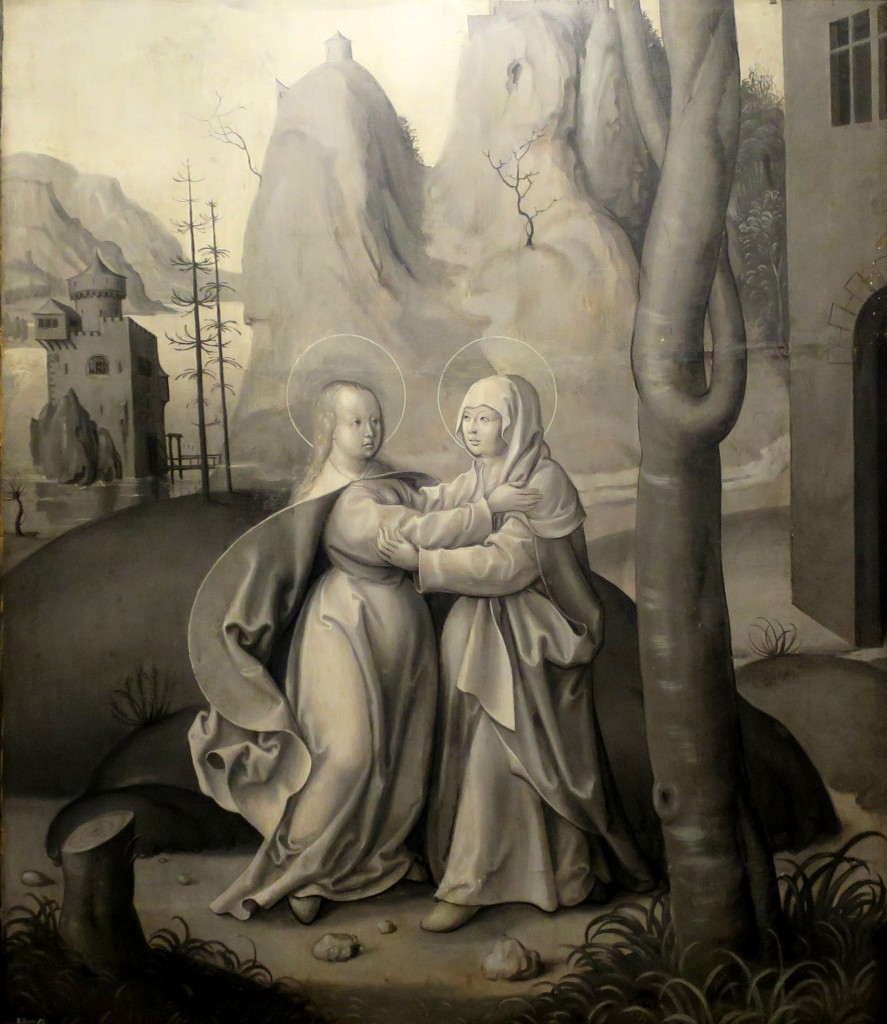Whenever the topic of ordination of women comes up, as it has once more, and whenever the Pope says “no can do”, as he has again – one can expect to see three typical responses: one group objects that the church is still not embracing full gender equality; another group tells the first to stop complaining and accept that the church can’t change; a third group thinks: well, it’s more complicated than that.
I’m in the third group. I have never advocated for ordination of women to the priesthood (though I have argued for the restoration of a female diaconate), because taking my membership in the body of Christ seriously means giving assent to certain teachings even if I am not entirely comfortable with them. It also means recognizing that we may not fully have explored the implications of these teachings, the possibilities available. We may have let things lie stagnant.
Pope Francis seems, in fact, to be admitting this:
[O]n women priests, that cannot be done. Pope St. John Paul II after long, long intense discussions, long reflection said so clearly. Not because women don’t have the capacity. Look, in the Church women are more important than men, because the church is a woman. It is “la” church, not “il” church. The Church is the bride of Jesus Christ. And the Madonna is more important than popes and bishops and priests. I must admit we are a bit late in an elaboration of the theology of women. We have to move ahead with that theology. Yes, that’s true.
Of course, also tacit in this statement is the usual response to women who think we should have a broader range of participation and inclusion in the church is: “you have Mary, what could be better than that?”
Three responses to this immediately come to mind:
- It’s curious to me, who have found Mary to be a great comforter and advocate of late, that male authorities so often use her to shut us up. Why is Mary being used against us, instead of for us? Why are we not invited to take the lead in exploring more fully the way in which Mary’s life and example resonates for us? If Mary is proof of the presence and glory of women in the church, talking about the complex experiences of motherhood, virginity, fertility, female friendship, female desire, maternal grief, female aging, ought to be our special prerogative. Conferences on women should be dominated by women speakers, but instead, so often, conferences on women in the church are fifty-fifty male and female. The Syracuse Catholic Women’s Conference has as its keynote speaker a man: Raymond Arroyo, not someone I am inclined to turn to, for deep wisdom about much of anything, let alone about my female vocation in the church. Imagine a Catholic Men’s Conference with a woman for a keynote speaker, women signing books. Burke and co would have conniptions, at this proof of the horrible feminization of the church. Most Catholic Men’s Conferences would not allow a woman to darken their manly, stalwart doors. The task of exploring Marian spirituality and devotion needs to be led by women. Otherwise, I don’t buy the whole “we have Mary” line. We don’t have Mary. The men have her, neatly fossilized in pink-and-white statues, silent, subdued.
- While the male identification with Christ in the priestly office, in persona Christi, provides ordained men with increased power and protection, women’s association with Mary is typically used to shame us, to highlight how poorly we live up to her example. While an ordained man is frequently excused of his failings on the ground of his priesthood, the reverse is true when it comes to women’s relation to Mary: her perfection is not our protection, but our shame. Because we can never live up to the impossible standard of being perfectly sinless, miraculously Virgin and Mother, we remain perpetually suspect. And yet, how much greater the gap is, between the moral character of a created human man, and the greatness of the Incarnate Word? Pope Francis has rightly criticized, harshly, the clericalism that emphasizes priestly power rather than priestly service. When women ask about ordination, it is presumed that this is a sin of clericalism, and that they are lusting after power. Perhaps in some cases, this is so. But to make this accusation without holding priests to higher standards looks like hypocrisy and rationalization.
- The image of Mary which is used to shame or silence us seems, often, to be only a pallid reflection of the full scope and power of her life. We are presented with the fact that Mary was obedient, that she suffered, and that she was perfectly pure. Her role as the Theotokos makes for splendid art, but this is rarely, in Catholic theology, extended into a meditation on how women can be God-bearers, the bodies giving body to divinity in humanity. Our sacramental life reiterates the significance of priests as standing in the person of Christ, but what about the fact that it was Mary that first brought God to us, within her own body? When we look at the life of Mary in the Gospels, the first thing we see is her radical acquiescence to a crazy request that could potentially have put her life in jeopardy. We see her making a decision about the gift of her own fertility, without consulting her father or her betrothed. We see her making a long journey, on her own, to give companionship to a female relation. We see her oppressed by an Imperialist regime into traveling, poor and pregnant, then giving birth in the most difficult of circumstances. We see her pondering things in her heart. We see her bossing God around. Purity in Mary is not something that exists for men, for male delectation and anticipation, but is something she reserves for her unique vocation to carry God. Her virginity is not “receptive” to men. Her obedience is to God, in spite of the dangers and demands of patriarchal political structures. She is not bound to her home, and indeed, we almost never see her in her home, but always traveling: to visit Elizabeth, to the census in Bethlehem, as a refugee to Egypt, as a pilgrim to Jerusalem. She travels as a missionary bearing with her the eternal Word.
As a Church, our conversations about the role of women always fall into one of two pitfalls: we can be impossibly vague, until our words are overgrown with a furze of jargon; or we can be impossibly specific, grievously offending perfectly good women who happen to be different from other perfectly good women.
Here’s the vague approach, epitomised by John Paul II, who had a special charism for expressing important and profound truths in a way that sounds nearly meaningless:
“Within Christianity, more than in any other religion, and since its very beginning, women have had a special dignity, of which the New Testament shows us many important aspects … It is evident that women are meant to form part of the living and working structure of Christianity in so prominent a manner that perhaps not all their potentialities have yet been made clear.”
The careful, motivated scholar can reap true inspiration, but the typical reader will wonder, “Do these people actually have anything to say?”
I think we would have a lot more to say, if women were to take the lead in talking about what it means to be ourselves. Imagine, as I pointed out earlier, if for three thousand years the job of understanding men had been left only to women? What a one-sided mess it would be.
I don’t mind that some doors are closed to us, as women, but it seems to me that other closed doors are just begging to be opened. Pope Francis seems to be seeing this, too. The real question is, when it comes to elaborating the theology of women, will the men be willing to sit back and listen, as we have listened to them for centuries? Or will we have to hear ourselves professionally mansplained, yet again?
image credit: https://commons.wikimedia.org/wiki/File:%27Mary_Visits_Elizabeth%27,_unknown_German_artist,_Bergen_Kunstmuseum.JPG US-PD













